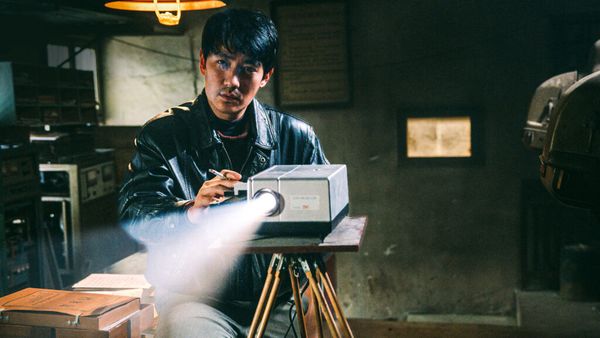Eye For Film >> Movies >> Only The River Flows (2023) Film Review
Only The River Flows
Reviewed by: Amber Wilkinson

The rain beats down repeatedly in Shujun Wei’s Chinese noir murder-mystery so maybe it should come as no surprise that the plot feels liquid - best to let it flow over you than try to fully catch it in your hands, although repeat viewings seem a likely itch many will want to scratch.
Adapted by Wei and Kang Chunlei from the novel by Hua Yu, this is 1990s small-town China, where capitalism is washing over Communism and where inky rivulets of humour flow in unlikely places. Detective Ma Zhe (Zhu Yilong) appears to be the boss’ pet. Presumably this is because that leaves the Chief of Police (Hou Tianlai) more time to practise his ping-pong prowess, in what is surely the best employment of table tennis satire since Blazing Saddles.

Ma’s team are also relocated to a defunct local cinema for reasons that are never fully explained - but do not fear, the locale is fully exploited by Wei in due course. The real and the imagined are part and parcel of a film which begins with a group of kids playing make-believe cops and robbers through a derelict building that is only half there, and where reality and imagination are increasingly hard to tell apart.
Death, of course, comes guaranteed and we’re invited to witness a murder from the killer’s perspective as they make short work of an old lady with a long knife. She, in one of the many examples of dry humour that soak up the more serious elements of the plot, is known locally simply as “Granny Four”. A suspect immediately presents himself, when Ma discovers that Granny had recently adopted a “madman”. But when a handbag is found near the riverbank holding a tape that, in turn, holds an interrupted love letter, it offers another possibility that Ma starts to chase down.
As investigations continue, it’s evident that a lot is being forced to happen in a clandestine way in the society of the period, where adherence to the “collective honour” the Chief of Police continually references, is the name of the social game.
The body count begins to tick up at the same time as things begin to destabilise on the homefront for Ma. He and his wife Bai Jie (Chloe Maayan) are told that their unborn baby may have a genetic defect that could cause them to be mentally disabled, and it’s not hard to see how Ma’s reaction could be connected to the “madman” he is trying to hunt.
Things are also becoming more fluid from our perspective. Why can’t Ma find his merit certificate? And how do you complete a jigsaw when you don’t have all the pieces? This last is a typical flourish from Wei. It could indicate his own unwillingness to offer a complete solution - and if you like those, this whole enterprise is not for you - but it also speaks to Ma’s mental state, while also offering a shard of sharp humour.
No matter that the plot development is deliberately murky, it’s the mood that catches you in its tides. Chengma Zhiyuan mirrors the gloom with his cinematography, beautiful in its bleakness and exploiting its occasional flaming flourishes to the max. For all its humorous asides, this is a plot that also captures domestic texture with detail - a scene in which Bai Jie and Ma share dinner and memories catches you by surprise with its emotional heft. Somehow it doesn’t matter if you can’t see the bottom of Wei’s mystery clearly, by the end of it, it still feels deep.
Reviewed on: 31 Jul 2024

















